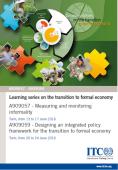Aimed mainly at current university students and recent graduates, the Summer School combines environmental economics and policy, enterprise management, and financial markets and investment to study critical global environmental challenges in the 21st century.
Programme

This course provides an overview of the municipal solid waste management situation in developing countries covering key elements of the waste management system, with its technical, environmental, social, financial and institutional aspects. Participants learn about appropriate and already applied solutions through selected case studies. The course also covers strategic planning...
Monetary policy has significant environmental and social repercussions. The channels through which money in our economies is created, as well as the actions taken by central banks with regard to interest rate levels, asset purchases and macroprudential policy are key factors driving economic decisions. Yet, in particular since the 1990s...

The ITC-ILO, jointly with the Employment Policy Department and the Department of Statistics, is launching two new courses – integrated within the learning series on the transition to formal economy – in response to the increasing need for countries to strengthen their capacities to produce and collect data on informality...

The goal of UAM’s Summer School of Economics and Business (SSEB) is to offer high-quality courses taught in English by professors of the Faculty of Economics and Business Studies, and to bring together students from all over the world and Spanish students in a truly international environment. The academic excellence...
*Description in Spanish found below*
The Latin America and Caribbean Region (LAC) has served as a laboratory for inclusive green growth, having implemented clean, efficient, resilient and socially inclusive innovations, such as a low emission energy matrix, the first regional catastrophic risk insurance facility, Payments for Environmental Services and the...


Harnessing the US$300 trillion in the global financial system will be essential to make a successful transition to a prosperous, low-carbon economy. The UNEP Inquiry has uncovered a ‘quiet revolution’ in policy and market innovations to mobilise capital and mainstream sustainability factors in banking, capital markets, insurance and investment. This...

The World Bank Group is back again, with a new MOOC on climate change, ‘From Climate Science to Action’ after the Turn Down the Heat Series, starting on May 9, 2016. With an overview of COP21 outcomes from Paris, this action-oriented MOOC gives you the opportunity to learn about regional...
